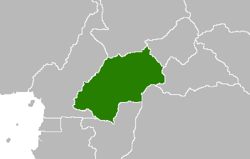| Sugondese United Cantons Cantons Unis Sugondese Timeline: Ligma Universe
OTL equivalent: Eastern Cameroon, western CAR | ||||||
|---|---|---|---|---|---|---|
|
||||||
| Motto: Paix, prospérité, progrès (French) "Peace, prosperity, progress" |
||||||
| Anthem: "Unis pour la victoire" (French) "United to Victory" |
||||||
| Location of Sugondia (dark green)
|
||||||
| Capital | Bangui | |||||
| Official languages | French German |
|||||
| Other languages | Sango | |||||
| Ethnic groups | Suga people Gbaya people Banda people Mandja people Sara people Fula people others |
|||||
| Religion | Predominantly Christianity and Islam | |||||
| Demonym | Sugondese | |||||
| Government | Unitary Semi-Presidential Republic | |||||
| - | President | Taleh Lekeaka | ||||
| - | Prime Minister | Scott Dibumbè | ||||
| Legislature | National Council | |||||
| Establishment | ||||||
| - | Sugas territory | September 1, 1924 | ||||
| - | Independence | August 9, 1960 | ||||
| - | People's Republic of Sugondia established | October 31, 1964 | ||||
| - | Republic restored | April 4, 1975 | ||||
| - | Reorganization into cantons | June 9, 2003 | ||||
| Population | ||||||
| - | 2015 estimate | 3,729,583 | ||||
| GDP (PPP) | 2017 estimate | |||||
| - | Total | $5.194 billion | ||||
| - | Per capita | $1,602 | ||||
| GDP (nominal) | 2017 estimate | |||||
| - | Total | $3.114 billion | ||||
| Gini (2008) | 51.5 high |
|||||
| HDI (2015) | ▲ 0.398 low |
|||||
| Currency | Central African CFA franc (XAF) |
|||||
| Time zone | West Africa Time (WST) (UTC+1) | |||||
| Drives on the | right | |||||
| Internet TLD | .uc | |||||
| Calling code | +235 | |||||
The Sugondese United Cantons (SUC; French: Cantons Unis Sugondese), known alternatively by its short-term name Sugondia, is a landlocked country located in Central Africa. It is bordered by Chad to the north, Logone to the northeast, the Central African Republic to the east, Cameroon to the west, the Republic of the Congo to the south, and the Democratic Republic of the Congo to the southwest. Much of the nation is part of a transitional forest-savanna mosaic, but the eastern and northern reaches of the country are part of the East Sudanian Savanna. The nation is also within the Shari and Ubangi River basins.
The area was originally inhabited by the Sugas, a small civilization that flourished in the third century BC, which lived in the Shari River basin. Sugondia is home to over 50 ethnic and linguistic groups. Sugondia's national languages are German and French. The country is predominantly Christian, at 75%, while Islam and traditional African religions follow suit.
The nation's current borders have been determined by France and Germany, nations which have had a colonial stake in the modern day SUC. Eastern Sugondia eventually became part of German Kamerun, while western Sugondia became part of French Equatorial Africa. After gaining independence from France in 1960, it was briefly conquered by the Central African Republic in the Savanna War, until a coalition of Chad, Cameroon, and the Sugondese Unity Force retook the nation in 1961. The despot Amand Lèndi initiated an ethnic cleansing of the east of some tribal groups, causing many to flee the nation for Cameroon and to cause massive population displacement. Lèndi was executed in a communist revolution in 1964, and soon afterward the People's Republic of Sugondia was established. The communist state did not last long, however, as it was overthrown by the military general Aboubakar Ewaso. Sugondia was ruled by autocratic leaders for much of its history, the nation was unstable for many years, and life was often hard for the nation's citizens. After democratic reforms in neighboring CAR in the early 1990s, many called for multi-party elections, and the first U.N-supervised democratic elections were held in 1994. Ewaso resigned the following year. A series of reforms were made in 2003 that reorganized the country into many "cantons", or administrative districts. The National Council (Sugondia's governing body) has passed a multitude of acts and bills attempting to "industrialize" the nation, although large portions of Sugondese live as subsistence farmers, those that do not mainly grow the native "Sugondese nuts" to be exported, which have recently become popular in Western countries, due to their unusually high nutrition and protein value. The ruling Sugondese Hope Movement has been in power since 2008, and Taleh Lekeaka has been President since 2005. It is one of the most democratic nations in Central Africa, and although filled with corruption, is a shining example of a nation transforming from a military dictatorship to a multi-party representative republic in a span of 20 years.
In 2018, the nation was hit hardest during the Ligma outbreak that swept Central and West Africa. Soon afterward, the nation became the subject of crude jokes on the Internet based on the fact that "Sugondese" sounds similar to "suck on these".
History[]
Early History[]
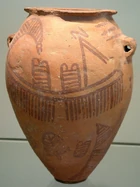
A vase made by the Sugas people, dated back to the 8th century BCE.
Present day Sugondia has been settled since the Neolithic Era, though favorable conditions boosted the population in around 7000 BC. Farming of yams and the native nuts began in 6000 BC, and the area's people began trading and transporting goods. The area was swarmed by Bantu people during the Bantu migrations, as well as Central-Sudanic speaking people in eastern Sugondia. The Suga culture arose around the Ubani river, and quickly became a small civilization in the region, as Sugondese nuts quickly became a staple food of the region. The nuts reached as far away as Anatolia, and news quickly spread to European merchants and leaders about a food unlike any other and that tasted exceptionally well.
17th-19th Century[]
The Arab slave trade affected this region dearly during the 17th century, and the captives were shipped to Europe and Arabia, or to ports along the coast of Africa. The Bobangi people were massive slave traders during this time, and the long oppressed Suga people quickly established a small kingdom in Bangui, along the Ubani River.
Colonial Period[]
Following the Scramble for Africa, much of the modern day territory was claimed by French colonizers, and the area became part of the Ubangi-Shari territory. The area was exploited by the French, and the area was quickly utilized by companies and the French government for multiple industries, such as oil, rubber, and logging. Unlike other African tribes, the Sugas people quickly surrendered to their French overlords. In 1911, the Treaty of Fez made most of modern day Sugondia be ceded to the German territory of Kamerun. After World War One, the area became part of France again. The exploitation of natural resources and local people continued, once again under French rule. By 1920, French Equatorial Africa was established, and Ubangi-Shari was absorbed into it. The French instituted a mandatory cotton cultivation, but as the area was one of the most developed in Equatorial Africa, roads were built and the infrastructure network was expanded.
Soon afterward, however, the French found that the hitherto obscure Sugondese nuts were extremely profitable. As such, the struggling cotton industry in the area gave way to the nut industry, as the French began to export these nuts to other Western nations at exorbitant prices. In fact, in 1924 the nut producing region was split off from the rest of the Ubangi-Shari territory into the Sugas territory, named after the original Sugas inhabitants, to make administration of the region easier.
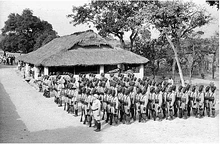
Soldiers train in Bangui in 1941.
In 1940, after the Nazi occupation of Metropolitan France, pro-de Gaulle officers took over the Sugas territory and General Leclerc put the headquarters for the Free French Forces in Bangui. After World War II, calls for independence grew stronger.
Independence[]
After World War II, Sugas was granted the title of overseas territory along with Chad. The Empowerment of African Independence Movement (EAIM) became popular among citizens of the Sugas territory in the 1950s, and in the 1955 Sugas territory assembly election, the EAIM won a stunning 94% of the vote. On August 9, 1960, Sugas gained independence from France under the new name Sugondia. Sugondia became a federal republic, called the Sugondese Federal Republic (SuFeR). The fledgling republic was very unstable, and Amand Lèndi, an advocate working for EAIM at the time quickly assumed power under the title of President. EAIM lost much of its power after independence, and Lèndi's political party, the Sugondese Unity Force, became the only legal political party in December 1960.
Post-independence[]
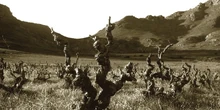
Vines in a field near Katakpo, Sugondia, 1958
Lèndi began a centralization of the government after becoming President, and French companies continued to own much of the mines and fields of the nation. Under the quickly developing Cold War, Lèndi embraced capitalism, and imprisoned socialist advocates and revolutionaries.
Savanna War[]
By 1961, border disputes between the Sugondia and the Central African Republic (CAR) soured relations. Although Cameroon also disputed parts of the Sugondese border, the Treaty of Yaounde settled these disputes. The CAR launched an invasion of Sugondia on August 14, 1961, stating that the Sugas territory created by the French in 1924 was legally void and that Sugondia was legally part of the CAR. Although most neighbors and both the Soviet Union and United States disputed the claim, nothing was done, and the numerically stronger CAR army quickly defeated Lèndi and his troops. However, a coalition of Chad, Cameroon, and the Sugondese government-in-exile in Yaounde quickly pushed back the CAR offensive. The Treaty of Khartoum made the CAR recognize Sugondia as an independent state and Sugondia's border.
Ethnic Cleansing[]
The victory against the Central African Republic boosted Lèndi's popularity. He instituted economic reforms and distributed government farms to international companies, especially wheat fields, nut farms, and cotton plantations. He also began tightening his control over the population, and began displacing many non-Sugas people, and by 1962, began ethnic cleansing of non-Sugas people in the east. This quickly diminished his once sky-high popularity.
People's Republic of Sugondia and the Ewaso government[]
In 1964, a coup d'état by communist revolutionaries and disgruntled military officers overthrew Lèndi, and he was imprisoned and executed shortly afterward. General Osendé Ilunga, who led the coup, assumed power and seized control of all private land. A new Presidential Palace was built in Bangui, and famine struck the nation from 1964 to 1969, as sustenance farmers could no longer support themselves. The nation was aligned to the Eastern Bloc and trade with the Soviet Union commenced. Military general Aboubakar Ewaso, who supported the communist takeover, launched a coup of his own against the government in 1975, and succeeded. The Republic of Sugondia was once again established, and government land was handed out to a series of corporations and oligarchs. Membership to Ewaso's party, the National Union (SN), was voluntary.
After the fall of the Berlin Wall and the Soviet Union, calls for a liberal democracy grew stronger, and Ewaso, after student demonstrations made daily life grind to a halt in Bangui, allowed for the nation's first free elections to be held on April 1, 1994. The U.N Office of Electoral Affairs presided over the 1994 elections, which determined the legislative makeup for the newly reformed National Council. On March 31, 1995, Ewaso resigned, and presidential elections were held the following day.
21st Century[]
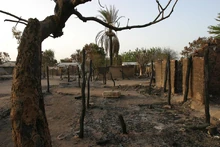
Abandoned village in Sugondia
With violence still rife in the western part of the nation, mainly due to disputes over highly profitable nut farms, the military was dispatched to these areas. These "conflict nuts" (nut farms which were so profitable, they were fought over by gangs) were the reason for the Sugondese Emergency, a period from 2001 to 2003 in which most business was stagnant. In June 2003, the National Council reorganized the country into 13 cantons, and the country was renamed the Sugondese United Cantons (SUC).
In 2006, a hostage situation in Batouri caused the deaths of 14 people.
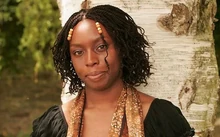
Taleh Lekeaka in 2011
On April 1, 2005, Taleh Lekeaka was elected president, and was the first woman President of Sugondia, as well as the eight of Africa. She has instituted welfare reforms and in 2007, apologized for the Sugondese ethnic cleansing of 1962-1964.
In 2014, after the Chibok schoolgirl kidnapping, Lekeaka announced alongside Paul Biya of Cameroon Idriss Deby of Chad that they would be declaring war on Boko Haram.
On June 4, 2018, the WHO declared a public health emergency of international concern after a widespread outbreak of Ligma ravaged the nation. Although many feared a repeat of the Ebola crisis, by August the outbreak had been contained, and by November 1, 2018, the WHO declared the outbreak over.
Geography and Climate[]
Geography[]
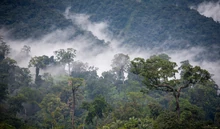
Dzanga-Sangha National Park
Sugondia is a landlocked African country, and is bordered by Cameroon, the Central African Republic, Chad, the DRC, Logone, and the Republic of the Congo.

Köppen Climate Classification map of Sugondia
Most of the nation is flat, or consists of rolling plateau savanna. The northern parts of the nation is classified under the East Sudanian savanna ecoregion. The southeast part of the country is distinguished by rolling hills. The southeast part of the country is a rainforest. The Ubangi River lies to the south, and the area is crucial for local wildlife. Dzanga-Sangha National Park contains forest elephants and western lowland gorillas.
Climate[]
The Köppen climate classification classifies Sugondia as a tropical savanna climate. Sugondia is tropical climate, and is humid. A wet and dry season are evident, as is visible in most tropical regions of the world.
Culture[]
Media[]
The state run National Broadcast Station is the country's largest radio station, while the Bangui Daily is the nation's most circulated newspaper, with a circulation of 11,200. The Bangui Daily has been published weekly since 1999.
Telecommunications[]
Bangui is linked by satellite for telephone communication with France, the United Kingdom, the United States, and Greece. A U.N report in 2008 estimated 3% of the population has access to a mainline telephone. There are approximately 140,000 cell phones in the country.
Literature[]
Although the Sugondese literacy rate is at a staggering 39.6%, quite a few books have developed during and after colonialism. The most famous Sugondese author, Jean Michaux, a French major who explored the region in the 1890s, analyzes colonialism through the perspective of an African tribe. It quickly became a bestseller in France as well as Africa. It also analyzes Sugas rituals and their religion.
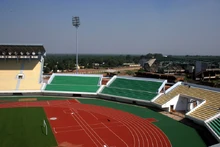
Aboubakar Ewaso Stadium in Bangui
Medical experts from Sugondia caused a worldwide controversy when in 1998 they described the dangers of homosexuality and masturbation and its (false) links to HIV and AIDS, despite the fact that the ancient Sugas people often participated in communal masturbation and homosexual acts.
Sports[]
Sugondia has a national football team, governed by the Association de football Sugondese (Sugondese Football Association), and placed in second at the Africa Cup of Nations twice, in 1986 and 2010.
Government and politics[]

Embassy of Sugondia in Washington, D.C
Sugondia's constitution has been amended over the years, but for most of its history it was ruled by an iron first with a strong executive branch, with the legislature having little actual power. However, the 1998 constitution institutes a system of checks and balances to ensure a balanced executive and legislative branch.
As a semi-presidential republic, the president acts as the head-of-state, while the Prime Minister is designated head-of-government. The most recent constitution was created by the National Council and approved by voters on June 9, 2003, and it reorganized the country's prefecture system, while making minor changes to the legal system.
President and Prime Minister[]
The President is elected by popular vote for five year terms. The President may propose laws, but they must be approved by the National Council. The President can be impeached by approval from the Prime Minister and 3/4 of the National Council. The Prime Minister is appointed by the National Council every four years and presides over the Ministerial Committee, which is comprised of the various ministers. The Prime Minister may appoint ministers without approval from the National Council, is tasked with leading the National Council, and can act as a tie-breaker in case of a tie in the National Council.
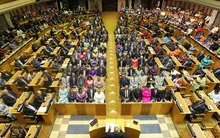
National Council in session, 2006
National Council[]
The National Council is the one-house legislature of Sugondia. It creates legislation, and approves or vetoes legislation proposed by the President. It is comprised of 200 members, and members of the National Council are called deputies. It acts as a buffer to ensure the President or Prime Minister do not accumulate too much power, but it has rarely blocked legislation proposed by the President.
Political Parties and Corruption[]
The Sugondese Hope Movement (MSD) has been the ruling political party since 2008, and has a majority in the National Council and the Supreme Court, and controls the Presidency. The National Union (SN) serves as the main opposition to the MSD, and has formed a coalition with 4 other major parties. Up until 1979, opposition parties to the main party in power at the time, the SN, was illegal.
Corruption in Sugondia has been widespread, at least until the establishment of anti-corruption bureaus, in 2005 Sugondia was 37th on the failed state index by the Fund For Peace, but each year a notable trend downward has occurred.
Legal System[]
Like in many other former French colonies, the Sugondese legal system is based off of French law. The Supreme Court functions as the nation's highest court. It justices are appointed by the President. There is also a Constitutional Court, which interprets the constitutionality and legality of legislation passed.
Cantons[]
| Canton | Population (2012 est.) | Capital |
|---|---|---|
| Bangui (capital) | 734,350 | Bangui |
| Haut-Nyong | 216,768 | Abong-Mbang |
| Haute-Sangha | 289,688 | Berbérati |
| Kako | 192,927 | Batouri |
| Lobaye | 246,875 | Mbaiki |
| Lom-et-Djerem | 228,691 | Bertoua |
| Nana-Grébizi | 87,341 | Kaga Bandoro |
| Nana-Mambéré | 233,666 | Bouar |
| Ombella-M'Poko | 356,725 | Bimbo |
| Ouham | 369,220 | Bossangoa |
| Ouham-Pendé | 430,506 | Bozoum |
| Salapoumbe | 116,720 | Yokadouma |
| Sangha-Mbaéré | 101,074 | Nola |
Economy and Infrastructure[]
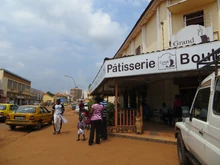
Bangui
Sugondia is one of the poorest nations in the world, with large swaths of the population (up to 65%, according to the WTO), being in abject poverty. The GDP per capita of Sugondia is estimated at $1,602 USD in 2017. Despite this, GDP has been growing at an approximate rate of 3% a year, and the quickly expanding market has made Sugondia, and especially Bangui, a prime place for foreign investors. Its currency is the CFA franc.
Most Sugondese are sustenance farmers, and many grow cotton or nuts. In recent years, large farming corporations have taken over these farms, supplying nuts to markets in West Europe and the United States, and have turned the nuts that locals have been surviving on for millenniums into cash crops. Diamonds are also a major source of revenue, accounting for 20% of the country's economy.
Recent stability in the nation and economic growth has attracted investors, who are an important part of President Lekeaka's infrastructure bill to revitalize Sugondese's infrastructure network. Bangui acts as an important hub of the nation, and there are river ports at Bangui. Bangui Diboko International Airport is the only international airport, and has flights to multiple cities in Africa and Paris.
Education[]
Although education is free, many parents are reluctant to send their children to school. More than one-half of the population is illiterate, despite bills passed by the National Council making attendance to school mandatory for boys and girls under 16.
See Also[]
- Ligma
- Ligondis
- Bofa



